Sports
/ArcaMax
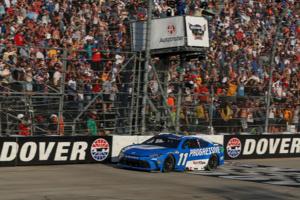
NASCAR announces race on U.S. Naval base in Coronado scheduled for 2026
LOS ANGELES — NASCAR is returning to Southern California, only its cars will be racing on the streets of Coronado and not on an oval in Fontana. The stock car racing circuit announced Wednesday it will be hosting a three-day series of races June 19-21, ending in a NASCAR Cup Series race on the U.S. Naval base in Coronado.
NASCAR did not race ...Read more

Adam Minter: F1's growing pains with Apple TV+ would be worth it
Fresh off earning a box-office hit with "F1," the movie, Apple Inc. has reportedly outbid ESPN for the U.S. broadcast rights to F1, the actual sport.
While F1 has not announced that it has accepted the deal, the nine-figure offer would enrich the elite racing championship. But it comes with a painful trade-off. Since 2018, F1’s American ...Read more
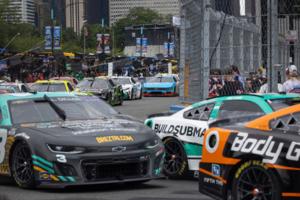
NASCAR won't hold Chicago Street Race in 2026 while exploring new date, shorter build-out
CHICAGO — Two weeks after its third annual Fourth of July weekend run through Grant Park, NASCAR has made the decision not to hold the Chicago Street Race in 2026, leaving open the door to return on a different date the following year.
In a letter Friday to Mayor Brandon Johnson, NASCAR said it is pausing the race because it needs more time ...Read more
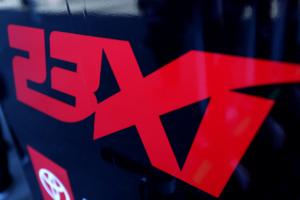
NASCAR blasts 23XI, Front Row for the teams' 'damaging and distracting' lawsuit
CHARLOTTE, N.C. — The two NASCAR Cup Series teams that are suing the governing body of NASCAR made another move Monday.
And NASCAR immediately fired back.
23XI Racing and Front Row Motorsports filed a preliminary injunction to maintain their charter status and to allow them to continue competing as Cup teams while litigation continues. This ...Read more
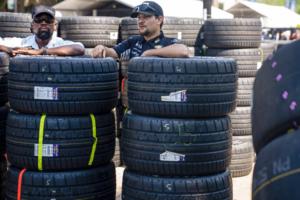
Crumb rubber: How NASCAR recycles the thousands of tires it used over the Chicago race weekend
CHICAGO — During a weekend of hot, high-speed friction against the asphalt of the NASCAR Chicago Street Race course, thousands of tires burn out and wear down. After a few dozen laps, they lose their grip and become obsolete.
But their life cycle doesn’t end there. Each NASCAR race weekend, most of the 3,000 tires provided by Goodyear ...Read more
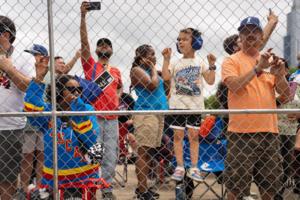
Mayor Brandon Johnson open to future Chicago NASCAR race, suggests date change
CHICAGO — Mayor Brandon Johnson is open to NASCAR returning to Chicago, but hinted Tuesday the city may need a better deal before stock car drivers again race through its streets.
NASCAR has 90 days to request a contract extension with the Chicago Park District. If the racing authority wants to win city leaders over, it could need to change ...Read more
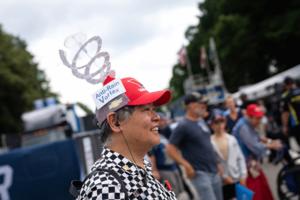
Rains hold off until after NASCAR race but outcome is the same as Shane van Gisbergen wins again
CHICAGO — This year the downpour waited until after the NASCAR Grant Park 165 was finished. After previous years were interrupted by storms, fans came ready for the weather Sunday.
Aaron Moy, 52, from Morton Grove, crafted an “Anti-Rain Vortex” hat to wear to today’s race: a strip of laminated printer paper spiraled around a plastic ...Read more
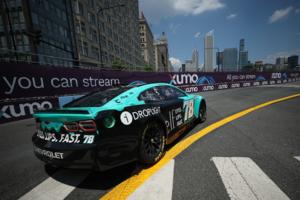
Paul Sullivan: As Katherine Legge qualifies for her 1st NASCAR Chicago Street Race, will this be the last one?
CHICAGO — Katherine Legge is used to being in the spotlight after years of driving Indy cars, so being the only woman competing in Sunday’s NASCAR Chicago Street Race would be no big deal.
Legge, the only female NASCAR driver, entered Saturday needing to qualify for one of the final four spots in Sunday’s Cup Series race. She understands ...Read more
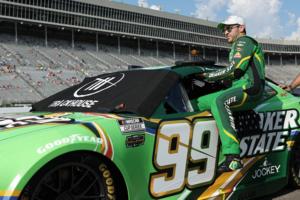
Daniel Suárez leaving Trackhouse Racing at end of NASCAR season
CHARLOTTE, N.C. — Daniel Suárez is a free agent.
The driver of the No. 99 Cup car will leave Trackhouse Racing at the conclusion of the 2025 NASCAR Cup Series season, the team announced Tuesday.
The decision is a mutual one, according to the team and Suárez himself. He will continue to compete for Trackhouse in the interim as the team ...Read more

Mac Engel: A $300 million gamble: Can Brad Pitt do for F1 what Tom Cruise did for NASCAR?
The lasting impression of the new movie F1 isn’t of the spectacular racing sequences on an IMAX screen but that of Brad Pitt. No one should look like that at any age, much less 61.
It’s not inspiring. It’s not motivational. It’s just depressing.
The hairline is intact, as are the abs and muscle tone. While I crushed pretzel bites in ...Read more
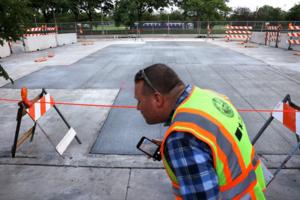
Chicago closes streets early to fix buckling pavement ahead of NASCAR race
CHICAGO — The NASCAR Chicago Street Race is still more than a week away, but Mother Nature is already burning up the track.
The heat dome that descended on Chicago last weekend with unrelenting 100-degree temperatures caused buckling pavement on a stretch of the pop-up race course, forcing the city to close some streets ahead of schedule to ...Read more

'Information is speed': NASCAR teams use AI to find winning edges
CONCORD, N.C. — Margins in NASCAR have never been smaller.
Whether it’s the leveling effect of the Next Gen car or the evolving technological arms race among teams, the Cup Series has never been tighter. And as parity grows, so does the need to uncover even the slightest competitive advantage.
That’s where artificial intelligence comes ...Read more
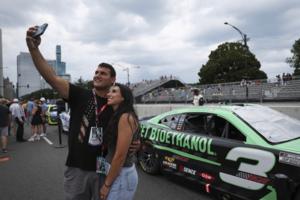
Are rain delays the NASCAR Chicago Street Race's superpower? The course 'puts on a great show,' Jeff Gordon says.
CHICAGO — Could the rain delays that dogged NASCAR’s Chicago Street Race in its first two years have inadvertently become its superpower?
“Wet weather road racing is really exciting,” four-time NASCAR Cup Series champion Jeff Gordon told Chicago’s City Club on Thursday night. “The most exciting type of racing is not only slick (...Read more

Why NASCAR driver Ross Chastain honored a late Army specialist: 'It was a dream ending for all of us'
PHILADELPHIA — After NASCAR driver Ross Chastain went from worst to first and won the biggest race of his life at the Coca-Cola 600 in Charlotte, N.C., he smashed a giant watermelon to honor his family’s farming history.
Then, he pulled out a photo of U.S. Army Specialist Kevin McCrea, a Philadelphia native who was disabled after a ...Read more
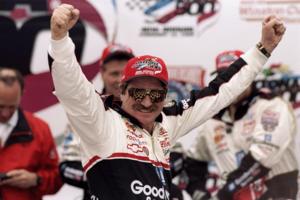
Vahe Gregorian: How a 'crisis' led Missouri accounting student to an Oscar and making of Earnhardt doc
KANSAS CITY, Mo. — When the legendary Dale Earnhardt died in a final-lap crash at the Daytona 500 in 2001, Dan Lindsay was about to graduate from the University of Missouri with a degree in marketing after he’d spent most of his time at MU studying accounting.
He had a vague notion of Earnhardt but was no NASCAR fan. To the contrary: In a ...Read more
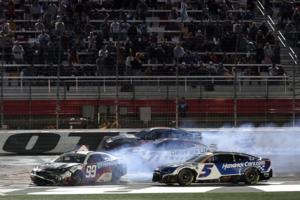
After second letdown, Kyle Larson offers an answer on future 'Double' attempts
CONCORD, N.C. — Cliff Daniels shook his head.
Chad Knaus stared in disbelief.
Kyle Larson, one of the greatest drivers in all of motorsports who woke up clinging to the hope that this Sunday would be equal parts remarkable and redemptive, rested his hands on his still steering wheel, wondering how this all could come undone again.
This wasn...Read more

How Ross Chastain won NASCAR's Coca-Cola 600 with a backup car
CONCORD, N.C. — Trackhouse Racing has captured NASCAR Cup Series wins on various stages.
Long before Ross Chastain became the first driver in 54 years to win a Cup Series race from the tail of the field at the Coca-Cola 600, Shane Van Gisbergen captured the inaugural Chicago Street Race in his debut, and Daniel Suárez got the best of the ...Read more

Scott Fowler: Watermelon win: Ross Chastain is a smash hit in NASCAR's Coca-Cola 600
CONCORD, N.C. — Watermelons often play key roles in Memorial Day picnics all across America, so it was fitting that one took center stage at the Coca-Cola 600 Sunday night.
Before a sold-out crowd at Charlotte Motor Speedway, Ross Chastain reeled in William Byron with six laps to go, then held him off for a fruitful victory.
As is Chastain�...Read more
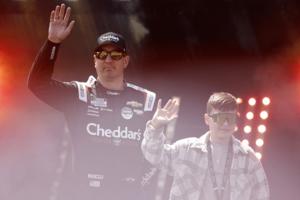
Kyle Busch isn't close to done in NASCAR. He has dreams to race with his son, after all.
CONCORD, N.C. — Richard Childress Racing picked up Kyle Busch’s driver option in his contract for 2026 on Saturday, keeping the two-time NASCAR Cup Series champion on one of the most decorated organizations in motorsports.
And during the press conference announcing the news, two drivers were asked about a bunch:
Kyle Busch, obviously.
But...Read more
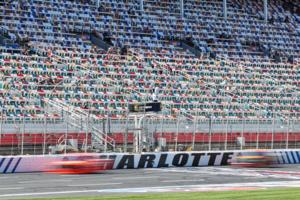
'It means a little more than the rest': Coca-Cola 600 weekend begins
CONCORD, N.C. — Austin Dillon started his Friday with a fresh cut — and he got a fresh reminder.
A fellow barber shop customer asked about local events happening. The customer said he was looking for something to do in the Charlotte area over Memorial Day weekend with his daughter.
Dillon’s barber interjected.
On top of being the ...Read more
Popular Stories
- NASCAR announces race on U.S. Naval base in Coronado scheduled for 2026
- Crumb rubber: How NASCAR recycles the thousands of tires it used over the Chicago race weekend
- NASCAR won't hold Chicago Street Race in 2026 while exploring new date, shorter build-out
- Paul Sullivan: As Katherine Legge qualifies for her 1st NASCAR Chicago Street Race, will this be the last one?
- After second letdown, Kyle Larson offers an answer on future 'Double' attempts





